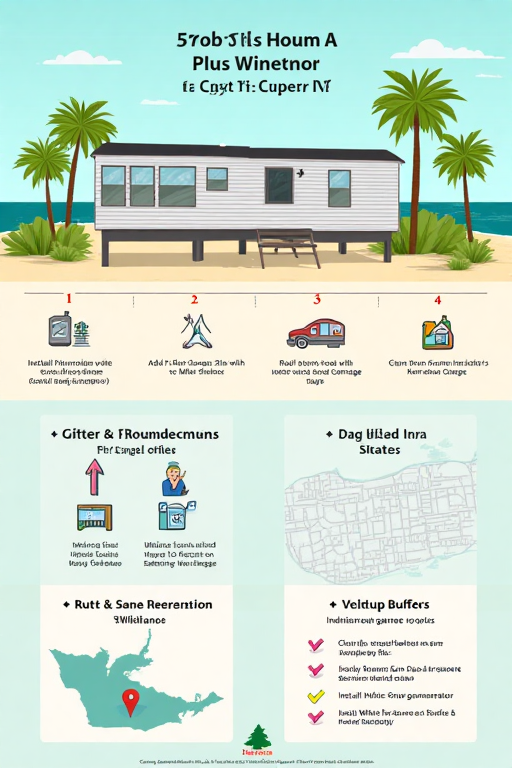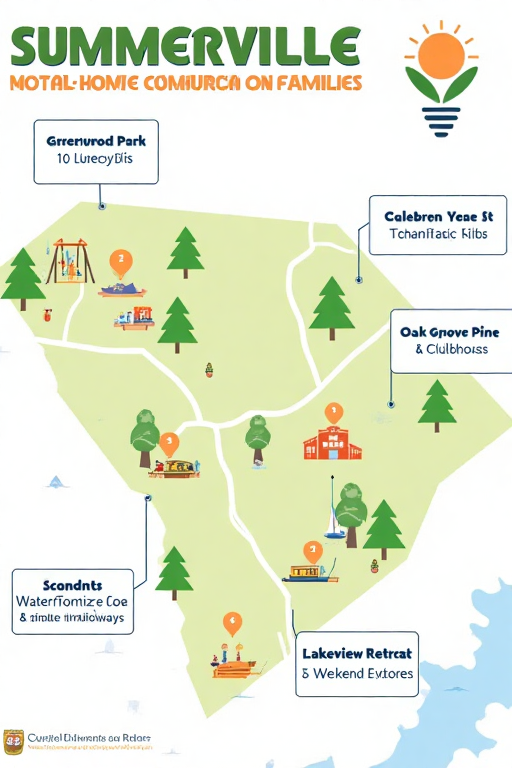Should You Rent Your Land or Buy Land for a Mobile Home in South Carolina?
Your Comprehensive Guide from Faith Mobile Home Solutions
Introduction
Deciding whether to rent your land or buy land for your mobile home in South Carolina is a major decision that can affect your long-term investment, lifestyle, and financial flexibility. With diverse options available in today’s real estate market, understanding the advantages and disadvantages of renting versus owning land is crucial. This comprehensive guide from Faith Mobile Home Solutions explores in depth the factors to consider, including market trends, financial implications, legal requirements, and personal priorities.
In this guide, you will learn about the different aspects of land acquisition and rental, including:
- Market overview and current trends in South Carolina
- Cost analysis, financing options, and tax implications
- The pros and cons of renting versus buying land
- Legal and regulatory considerations impacting mobile home placement
- Negotiation strategies and expert tips for securing the best deal
Whether you are a mobile home owner looking to establish a permanent residence or an investor exploring new opportunities, our ultimate guide will empower you to make an informed decision. Let’s explore the key factors that will help you decide: Should you rent your land or buy land for your mobile home in South Carolina?
Market Overview: Understanding the South Carolina Land Market
Before deciding whether to rent or purchase land, it is essential to understand the real estate market dynamics in South Carolina. The market for mobile homes and available land is influenced by economic growth, regional demand, zoning regulations, and the overall desirability of neighborhoods.
Economic and Demographic Trends
The South Carolina real estate market has experienced steady growth over recent years, driven by economic expansion and demographic shifts. The affordability of mobile homes makes them an attractive option for first-time homeowners, retirees, and investors alike.
Land Availability and Zoning
Available land for mobile home placement ranges from rural lots to designated mobile home parks. Zoning regulations determine whether the land can be used for residential mobile homes, and these rules vary by municipality. Understanding these zoning laws is crucial whether you plan to rent land or buy it outright.
Comparative Market Analysis
By examining recent sales, rental prices, and market trends, you can assess the value of land in the areas you’re interested in. A comparative market analysis (CMA) will provide insights into expected costs and help you negotiate more effectively, whether renting or buying.
This market overview lays the groundwork for evaluating the financial and practical aspects of renting versus buying land for your mobile home.
Financial Considerations: Budgeting and Investment Analysis
Your decision to rent or buy land will have significant financial implications. In this section, we explore various cost factors, including upfront expenses, ongoing costs, financing options, and potential tax benefits.
Upfront Costs
When buying land, you must consider the purchase price, closing costs, and any upfront repairs or improvements necessary to prepare the site for your mobile home. Renting land may involve security deposits and lower initial payments, but can include monthly rental fees that add up over time.
Ongoing Expenses
Ongoing costs for buying land may include property taxes, maintenance, and insurance, while renting land will involve regular monthly payments, which may be subject to increases over time. Evaluate your long-term budget to determine which option aligns better with your financial situation.
Financing and Tax Implications
Financing options differ significantly between renting and buying land. Purchasing land may require a mortgage or land loan with varying interest rates, while renting can offer more flexible payment arrangements. Additionally, property ownership can offer tax deductions and potential appreciation benefits that renting does not.
Return on Investment (ROI)
Conduct a thorough ROI analysis comparing the benefits of land ownership against the cost efficiency of renting. Consider potential future appreciation, tax incentives, and the security of owning your land versus the flexibility of renting.
Understanding these financial factors will enable you to make a well-informed decision that aligns with your long-term investment goals.
Pros & Cons: Renting vs. Buying Land
Both renting and buying land for your mobile home have distinct advantages and disadvantages. This section outlines the key pros and cons to help you weigh your options.
Renting Land
- Pros:
- Lower upfront costs and initial financial commitment
- Flexibility to move or change properties easily
- No responsibility for property maintenance or repairs (usually handled by the landlord)
- Opportunity to test the market or area before committing to a purchase
- Cons:
- Ongoing monthly payments that may increase over time
- No property equity or appreciation benefits
- Potential restrictions imposed by the property owner or mobile home park rules
- Less control over modifications or long-term use of the land
Buying Land
- Pros:
- Build equity and benefit from future appreciation of land value
- Greater control over property use and improvements
- Potential tax benefits and deductions associated with property ownership
- Long-term investment opportunity with increased security
- Cons:
- Higher upfront costs including down payment and closing fees
- Ongoing expenses such as property taxes, maintenance, and insurance
- Responsibility for all repairs and property management
- Limited flexibility if you need to relocate or change investment strategy
By carefully considering these pros and cons, you can determine which option aligns best with your personal circumstances, financial situation, and long-term goals.
Legal & Regulatory Aspects: What You Need to Know
Land transactions in South Carolina are subject to various legal and regulatory requirements that can impact your decision to rent or buy land for your mobile home. Understanding these aspects is crucial for avoiding pitfalls and ensuring compliance.
Zoning Laws and Land Use
Local zoning regulations dictate how land can be used. When buying land, make sure the property is zoned for residential mobile homes or that it can be rezoned if necessary. Renting land also requires compliance with any rules set by the landowner or mobile home park operator.
Building Permits and Inspections
If you plan to build or modify a mobile home on purchased land, you will need to adhere to building codes and secure the necessary permits. Rental arrangements may have additional stipulations outlined in lease agreements.
Property Titles and Liens
Ensure that any land you purchase has a clear title free of liens or other encumbrances. Title searches and legal consultations are essential steps in the buying process.
Contractual Agreements
Whether renting or buying, it is important to have a solid contractual agreement in place. Rental agreements should clearly outline rights, responsibilities, and terms, while a purchase contract must detail all aspects of the sale, financing, and any contingencies.
Legal and regulatory due diligence protects your investment and ensures a smoother transaction process, regardless of whether you choose to rent or purchase land.
Negotiation Strategies: Securing the Best Deal
Negotiation is a key component whether you decide to rent or buy land for your mobile home. Using effective negotiation strategies can help you secure a favorable deal and potentially lower your overall costs.
Research and Data Collection
Before entering negotiations, gather as much data as possible about recent land sales or rental rates in your area. A Comparative Market Analysis (CMA) can serve as a powerful tool to justify your offer.
Setting Your Objectives
Establish clear negotiation objectives such as your maximum purchase price, acceptable monthly rent, and any additional terms you want to include in the agreement.
Highlighting Property Condition
If the land requires improvement, use this as leverage. Document any deficiencies or additional costs needed to make the land suitable for a mobile home, and negotiate a lower price or favorable lease terms accordingly.
Understanding Seller Motivation
Try to understand the seller’s or landlord’s motivation. A motivated seller might be more willing to negotiate on price or lease terms, especially if the property has been on the market for a while.
Patience and Persistence
Negotiations can be lengthy. Maintain a patient and persistent approach, and be willing to walk away if the deal does not meet your criteria. Sometimes, showing that you have alternatives can encourage the other party to make concessions.
Strong negotiation strategies, backed by data and clear objectives, will enable you to secure the best possible deal, whether renting or buying land for your mobile home.
Expert Tips from Faith Mobile Home Solutions
Our team at Faith Mobile Home Solutions has extensive experience in the South Carolina mobile home and land market. Here are our top expert tips to help you decide and negotiate effectively whether to rent or buy land for your mobile home:
Start Early with Research
The earlier you begin researching local land values, zoning laws, and market trends, the more informed you will be during negotiations. Early research gives you a competitive edge.
Work with Local Experts
Consult with real estate agents, land appraisers, and legal advisors who have experience in the South Carolina market. Their expert knowledge can help you navigate complex issues and ensure that you make a sound decision.
Weigh Long-Term Benefits vs. Short-Term Savings
Consider not only the immediate costs but also the long-term benefits such as property appreciation, tax deductions, and the ability to customize or expand your home.
Keep Communication Clear and Professional
Whether negotiating a rental agreement or a purchase contract, clear and professional communication is key. Document all discussions and agreements in writing to avoid misunderstandings later.
Stay Flexible and Open to Alternatives
Sometimes a hybrid option may be available—such as a lease-to-own arrangement—that offers the flexibility of renting with a path to ownership. Keep an open mind during negotiations to maximize your opportunities.
Review All Contracts Thoroughly
Before finalizing any deal, have all contractual documents reviewed by a real estate attorney to ensure your interests are protected and that all legal requirements are met.
Implementing these expert tips will help you negotiate a deal that aligns with your financial goals and provides the best foundation for long-term success in the South Carolina mobile home market.
Conclusion: Rent or Buy—Make an Informed Decision
Deciding whether to rent your land or buy land for your mobile home in South Carolina is a decision that should be made after careful consideration of your financial situation, long-term goals, and the local market conditions. Both options offer unique advantages and potential drawbacks, so it is essential to weigh every factor—from upfront costs and ongoing expenses to legal obligations and potential returns.
Armed with thorough market research, solid negotiation strategies, and expert advice from Faith Mobile Home Solutions, you are now prepared to make an informed decision that maximizes your investment and meets your lifestyle needs. Whether you opt for the flexibility of renting or the long-term benefits of buying, the right choice will set the foundation for a rewarding mobile home experience in South Carolina.
Thank you for trusting Faith Mobile Home Solutions as your go-to resource for mobile home investment and real estate advice. We wish you success in negotiating the best deal and achieving a prosperous future with your mobile home.
Frequently Asked Questions (FAQs)
1. What are the main factors to consider when deciding whether to rent or buy land?
Consider upfront and ongoing costs, long-term investment potential, flexibility, tax benefits, and zoning regulations.
2. Which option is generally less expensive upfront?
Renting land typically involves lower upfront costs compared to buying, though long-term expenses may vary.
3. How does owning land affect mobile home resale value?
Owning land can increase the resale value by providing equity and greater control over property improvements.
4. What are the benefits of renting land for a mobile home?
Renting offers flexibility, lower initial costs, and an easier way to test the market without a significant commitment.
5. What legal issues should I consider when buying land?
Ensure clear title, comply with zoning laws, obtain necessary permits, and consult with a legal professional to avoid liens or disputes.
6. How do property taxes differ between renting and owning land?
Owning land typically means you are responsible for property taxes, while renting land transfers that obligation to the landlord.
7. What financing options are available for buying land?
Financing options include land loans, traditional bank loans, and sometimes specialized financing programs for rural properties.
8. Can I negotiate rental terms when renting land?
Yes, rental agreements are often negotiable in terms of monthly rent, lease duration, and renewal options.
9. What is a Comparative Market Analysis (CMA) and why is it important?
A CMA compares recent sales or rental rates of similar properties in the area to help you determine a fair market value.
10. How can I maximize my return on investment when buying land?
Focus on properties with high appreciation potential, consider tax benefits, and make strategic improvements to increase market value.
11. Is it possible to rent-to-own land for a mobile home?
Yes, some arrangements allow you to rent with an option to buy, combining the flexibility of renting with the benefits of ownership.
12. How do I determine if land is zoned for mobile homes?
Consult local zoning maps and speak with your county planning office to confirm land use designations applicable to mobile homes.
13. What role does location play in deciding to rent or buy land?
Location affects market demand, property values, accessibility, and potential for appreciation, making it a critical factor in your decision.
14. How do I handle negotiations with landowners or sellers?
Be well-prepared with market data, have a clear budget, and be ready to negotiate terms such as price, lease duration, and additional costs.
15. Are there any tax incentives for purchasing land in South Carolina?
Some areas offer tax breaks or incentives for land purchases, especially in designated rural or redevelopment zones.
16. How does owning land impact maintenance responsibilities?
Ownership means you are responsible for maintenance, including landscaping, property repairs, and improvements, which can affect overall costs.
17. What are the risks of renting land for your mobile home?
Risks include potential rent increases, less control over the property, and the possibility of not being able to make permanent modifications.
18. How do I assess the long-term investment potential of buying land?
Consider factors like property appreciation, market stability, and potential for future development in your chosen area.
19. Can I resell my mobile home separately from the land?
In some cases, mobile homes can be sold separately from the land, but this depends on local regulations and whether the home is classified as personal or real property.
20. What is the typical timeframe for buying land for mobile homes?
The timeframe can vary from a few weeks to several months depending on market conditions, due diligence, and financing arrangements.
21. How do lease agreements differ when renting land?
Lease agreements for land will detail rental terms, maintenance responsibilities, and restrictions that may differ significantly from property purchase contracts.
22. What should I look for in a land title report?
Ensure the title is clear of any liens or disputes, check for easements and zoning restrictions, and verify the land’s legal boundaries.
23. How important is a professional appraisal when buying land?
A professional appraisal provides an objective estimate of the land’s value, which is crucial for securing financing and negotiating a fair price.
24. Can I use a land lease option if I’m not ready to buy outright?
Yes, a lease-to-own or land lease option allows you to rent with the possibility of buying later, offering both flexibility and eventual ownership benefits.
25. Where can I find more resources about mobile home land transactions in South Carolina?
For additional information, check local real estate websites, consult with property management professionals, and visit Faith Mobile Home Solutions for expert advice.
Additional Keywords
- rent land mobile home
- buy land mobile home
- land for mobile home
- South Carolina real estate
- Faith Mobile Home Solutions
- land investment SC
- mobile home property
- land lease vs buy
- mobile home financing
- land appraisal
- rural land mobile home
- mobile home land market
- residential land buying
- affordable land SC
- property value increase
- real estate negotiations
- mobile home park
- tenant rights mobile home
- building permits
- land zoning SC
- investment property
- mobile home resale
- financial planning real estate
- land tax benefits
- real estate tips




